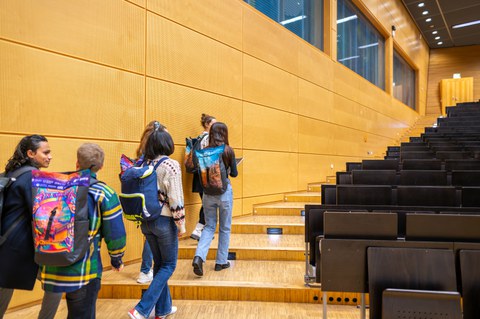Semester schedule
Whether you're just graduating from high school or have already completed your application to study at the TUD Dresden University of Technology, you're bound to be interested in what it's like to study. In movies, series or on social media, you often see students attending lectures and spending the rest of the day relaxing and hanging out with friends. But life as a student is not quite like that.
Table of contents
Semester schedule
Unlike a school year, a semester is not a whole calendar year, but only 6 months. Once a semester is over, the new semester follows on seamlessly. The winter semester, in which a course of study normally begins, is followed by the summer semester. Each semester is divided into the following phases:
The lecture period is the time in the semester when courses take place and you are theoretically active at the university. Why theoretically? Quite simply, here at TU Dresden there is no compulsory attendance, i.e. theoretically you don't have to attend any courses, just take your exams. However, this is not necessarily easy without attending the courses. You will find out after a while how intensively you have to attend your courses.
The core examination phase follows the lecture period and takes place during the lecture-free period. You will write exams during these weeks, but you may also have to write exams during the lecture period. How many exams you have to write depends on how many modules you take, but you do not have to take an exam for every module.
You don't have any classes during the lecture-free period , but that doesn't necessarily mean you have time off. You often have to work on assignments or study on these days or during these weeks, so how much time you have off depends on your modules and is very difficult to know in advance. However, if you do have time off, you can use it to complete an internship - or you can simply take a vacation and enjoy your time off, because taking a break is also important :)
You can also import the academic year into your calendar so that you have a precise overview of the lecture period and lecture-free period, as well as public holidays and "vacations".
Courses
There are various courses at the university that you can attend. Some of these are very different to what you may remember from school. Although the day is also divided into different lessons, these no longer last just 45 minutes, but 90 minutes.
On this page you will find an overview of the courses offered at the TUD.
Independence
However, the schedule is not the only difference to school. Studying requires you to be much more independent and disciplined, as nobody is really after you to do your homework. This is all your own responsibility. But there's no need to worry! Of course, you won't be left alone. You can always address your questions to the lecturers or your fellow students.
Exam performance
Now it's important to know what exams are. Here, too, there are different types depending on your module. If you want to know which achievements you have to complete for a module, you should look in the module description in your study regulations , where you will find a description. Examinations are comparable to tests, class tests or presentations at school. They are also graded from 1.0 to 5.0. If you pass your exams with a grade of 4.0 or better, you have passed your module and will receive credits for it.
Credits, also known as ECTS points, are a unit of measurement for the time you have to spend on a module. The time includes not only the time you spend in the course, but also the time you spend preparing for and following up on the course, self-studying, preparing for the exam and taking the exam. One credit corresponds to 25 to 30 hours of work, i.e. a module that comprises 5 ECTS has a workload of 125 to 150 hours. According to the study regulations, you should usually complete around 30 ECTS in one semester, which means you work 750 to 900 hours within one semester. In order to obtain a degree, you need a certain number of credits, e.g. 180 credits for a Bachelor's degree, which corresponds to 6 semesters, i.e. 3 years of full-time study.
You can find out how many credits a module provides, how many credits you need and further information in your study regulations and the module descriptions.


